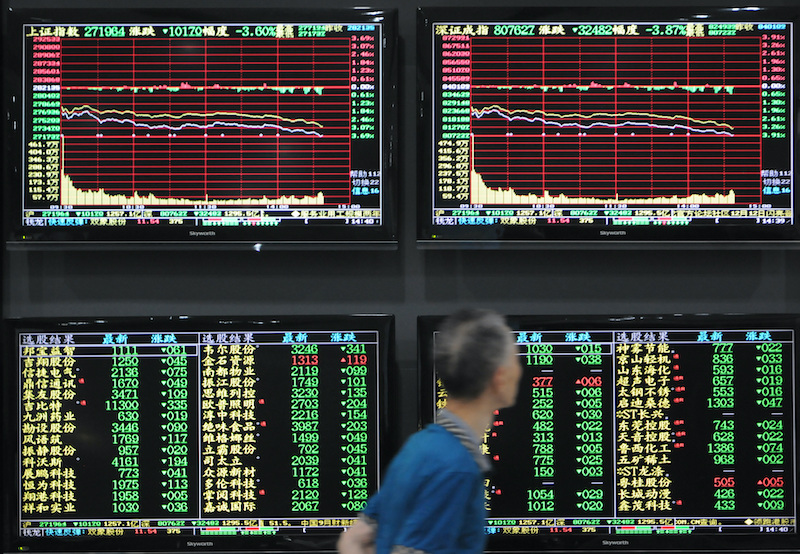Asian stocks saw an underwhelming start to the week with investors on edge as fighting in Gaza escalated, threatening a wider Middle East conflict, and with many also nervous ahead of a series of key central bank meetings this week.
The earnings season also continues with Apple, Airbnb, McDonald’s, Moderna and Eli Lilly & Co among the many reporting but results so far have been low key, contributing to the S&P 500’s retreat into correction territory which fed the mood across Asia on Monday.
Japan’s Nikkei share average fell, tracking Wall Street’s Friday declines as caution ahead of central bank meetings domestically and in the United States also hurt risk appetite. Many are speculating the Bank of Japan (BOJ) might tweak its yield curve control (YCC) policy after its two-day policy meeting wraps up on Tuesday.
Also on AF: G7 Agree AI Code of Conduct to Limit Tech Threat Risks
The Nikkei share average fell 0.95%, or 294.73 points, to close at 30,696.96, while the broader Topix was down 1.04%, or 23.41 points, to 2,231.24.
The Bank of Japan started its two-day policy meeting on Monday under growing pressure to shift further away from its controversial bond yield control as the 10-year bond yield nears the bank’s policy cap of 1%.
Chinese stocks rose, helped by fresh signs of government-orchestrated support measures, while Hong Kong shares were muted amid persistent fears of an escalation in the Middle East war.
More than 30 Chinese-listed companies unveiled share buyback and purchase plans over the weekend while major mutual fund house E Fund Management said it would invest in its own product.
China’s blue-chip CSI 300 Index closed 0.60% higher. The Shanghai Composite Index edged up 0.12%, or 3.77 points, to 3,021.55, while the Shenzhen Composite Index on China’s second exchange was ahead 1.40%, or 25.93 points, to 1,884.54.
Chinese tech stocks were strong, but banking shares fell on shrinking margins, while property shares declined as China Evergrande Group moved toward a possible liquidation.
The real estate giant slumped nearly 10% as a Hong Kong court gave it a five-week reprieve to come up with a deal for creditors or face liquidation.
Hong Kong’s Hang Seng Index ended flat, tracking broadly mixed Asian markets as Israel’s push into Gaza stirred fears of a wider conflict. The Hang Seng Index edged up 0.04%, or 7.63 points, to 17,406.36.
Elsewhere across the region, Sydney, Singapore, Taipei and Wellington were in the red, though Seoul, Mumbai and Jakarta eked out gains. MSCI’s broadest index of Asia-Pacific shares outside Japan eased 0.04%, having hit a one-year low last week.
Gaza Push Dulls Risk Appetite
Globally, risk appetite was dulled by Israel’s push to surround Gaza’s main city in a self-declared “second phase” of a three-week war against Iranian-backed Hamas militants.
S&P 500 futures did edge up 0.4% to 4,153.5, while Nasdaq futures added 0.5%. Eurostoxx 50 futures slipped 0.1% and FTSE futures gained 0.2%.
Yields on 10-year Treasuries stood at 4.8751% on Monday, having climbed 30 basis points so far this month and touched 16-year peaks at 5.021%.
The sharp rise in market borrowing costs has convinced analysts the Federal Reserve will stand pat at its policy meeting this week, with futures implying a full chance of rates staying at 5.25-5.5%.
Job figures due on Friday are forecast to show US payrolls rose a still solid 188,000 in October, after September’s blockbuster gain, but annual growth in average earnings is still seen slowing to 4.0% from 4.2%.
The Bank of England is also expected to stay on hold this week, with markets pricing around a 70% chance it is done tightening altogether.
Oddly the ascent of US yields has not helped the dollar any higher recently. The dollar was steady against a basket of currencies at 106.56, having bounced between 105.350 and 106.890 last week. It was flat on the yen to 149.60, and short of last week’s top of 150.78.
In commodity markets, gold was steady at $1,998 an ounce. Oil prices eased as worries about demand outweighed risks to Middle East supplies, at least for the moment. Brent lost $1 to $89.45 a barrel, while US crude fell $1.13 to $84.41.
Key figures
Tokyo – Nikkei 225 < DOWN 0.95% at 30,696.96 (close)
Hong Kong – Hang Seng Index > UP 0.04% at 17,406.36 (close)
Shanghai – Composite > UP 0.12% at 3,021.55 (close)
London – FTSE 100 > UP 0.80% at 7,349.96 (0935 GMT)
New York – Dow < DOWN 1.12% at 32,417.59 (Friday close)
- Reuters with additional editing by Sean O’Meara
Read more:
Asia Investors Watch Nervously as Middle East War Intensifies
HK Court Gives China Evergrande a Month to Rejig Its Debt Plan
Asia Economies Warned High Inflation to Persist Into Late 2024
Hang Seng, Nikkei Rally on US Inflation Hopes, China Data
























